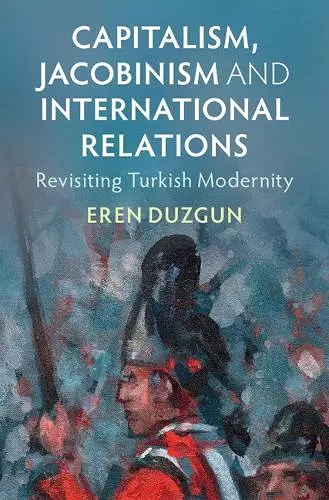Capitalism, Jacobinism and International Relations
Revisiting Turkish Modernity
Format:Hardback
Publisher:Cambridge University Press
Published:23rd Jun '22
Currently unavailable, and unfortunately no date known when it will be back
This hardback is available in another edition too:
- Paperback£25.99(9781009158350)

This book offers a radical reinterpretation of modernity through Jacobinism, examining its influence on Turkey's historical development and global modernity.
This book presents a thought-provoking analysis of 'Jacobinism' as a distinct geopolitical economy, offering a fresh perspective on Turkish modernity from the 19th century to the present. By examining the historical trajectory of Jacobinism, the author argues that the French Revolution was not merely a precursor to capitalist modernity but established an alternative political and economic framework. This reinterpretation is particularly relevant for scholars and students in international relations, historical sociology, and political economy, especially those focused on Turkey and the Middle East.
In Capitalism, Jacobinism and International Relations, the author traces the influence of Jacobinism within the Ottoman Empire and Turkey, asserting that the modernization efforts in this region prior to the 1950s were characterized by a unique form of Jacobinism rather than capitalism. This perspective challenges conventional narratives about the development of modernity and highlights the significant impact of Jacobinism on global modernization processes. The book contends that the legacy of Jacobinism shaped the subsequent authoritarian consolidation of capitalism in contemporary Turkey.
Through this exploration, the author establishes a novel framework for understanding the origins and evolution of global modernity. By positioning Jacobinism at the center of this historical narrative, Capitalism, Jacobinism and International Relations invites readers to reconsider the complexities of modernity and its diverse pathways, ultimately enriching the discourse surrounding the political and economic history of Turkey and beyond.
'Capitalism, Jacobinism and International Relations: Revisiting Turkish Modernity makes a powerful case for rethinking the course of modern world development through his masterful account Jacobinism as an alternative route to modernity. It is also an indispensable source for understanding the origins, contradictions and likely direction of Turkey's ongoing attempts at redefining its place and role in contemporary world.' Kamran Matin, Senior Lecturer in International Relations, Sussex University
'Duzgun's Capitalism, Jacobinism and International Relations is a must-read for any student of global history and global international relations. Duzgun brilliantly uses the Turkish case to completely rethink our understanding of modernity and modernization everywhere.' Ayşe Zarakol, Professor of International Relations, University of Cambridge
'Rejecting nomothetic and teleological models in international historical sociology, the study brilliantly deploys Political Marxism to provide a novel interpretation of the geopolitically refracted Turkish/Ottoman trajectory to its specific capitalism-cum-Jacobinism version of modernity. Exhaustively researched and intelligently argued, Duzgun's critique of the abstract and transhistorical categories of international modernity is compelling, immeasurably advancing our understanding of the making of modern Turkey.' Benno Teschke, Professor of International Relations, University of Sussex
'Agree or disagree with Duzgun's conclusions, Capitalism, Jacobinism and International Relations is a remarkable scholarly achievement, deftly melding historical depth with theoretical rigor. Foregrounding the causal role of 'the international,' the book offers a highly original reinterpretation of the historically distinctive Ottoman-Turkish path to modernity. Duzgun's work should be required reading for all students and scholars interested in international relations, historical sociology, political economy, and Ottoman-Turkish history.' Alexander Anievas, Associate Professor, Department of Political Science, University of Connecticut
'This book offers a transdisciplinary historical sociological account of the development of capitalist modernity in Turkey, via the conception of 'Jacobinism.' This is definitely a powerful challenge to the mainstream narratives on Turkish political and economic history. However, its success is not limited to this, as Eren Duzgun ultimately turns 'Jacobinism' into a fruitful analytical tool to make sense of the ongoing 'authoritarian' drive in Turkey and worldwide.' Pinar Bedirhanoğlu, Associate Professor, Department of International Relations, Middle East Technical University, Ankara
'This is an excellent book that makes a thought-provoking contribution to the critical scholarship on the historical sociology of Turkish modernity, from a truly original perspective that combines the most innovative aspects of international historical sociology and Political Marxism. By differentiating between capitalist and Jacobin versions of modernity, the book not only offers a fresh understanding of uneven and combined development as part of a new epistemological approach to international relations theory, but also provides new insights into the historical origins of current authoritarianism in Turkey. A must-read for everyone interested in the critical scholarship on historical sociology, international relations theory, and contradictions of Turkish modernity.' Şebnem Oğuz, Associate Professor of Political Science at Baskent University, Ankara
'Eren Duzgun presents ground-breaking discoveries that will change the way scholars think about the French Revolution and the Turkish transition to capitalism. Duzgan shows that Jacobinism established a nationalist, non-capitalist model for industrialization adopted by an array of countries in the nineteenth and twentieth centuries. It wasn't until very recently that Turkey broke with this model and embarked on a path of capitalist development.' Stephen Miller, Professor, Department of History, The University of Alabama at Birmingham
'Capitalism, Jacobinism and International Relations: Revisiting Turkish Modernity makes a powerful case for rethinking the course of modern world development through his masterful account Jacobinism as an alternative route to modernity. It is also an indispensable source for understanding the origins, contradictions and likely direction of Turkey's ongoing attempts at redefining its place and role in contemporary world.' Kamran Martin, Senior Lecturer in International Relations, Sussex University
'… excellent … a new, bold, transdisciplinary interpretation of critical events that connects the multiple threads of postmodernity in a non-Western environment … Highly recommended.' S. M. McDonald, Choice
'… this book is a valuable resource for those interested in deep-rooted transitional debates, such as the Brenner debate, and their dialogue with the current international historical sociology literature. It also provides insight into the perspective of Ottoman/Turkish modernization from political Marxism's side of the debate.' Kadir Selamet, New Perspectives on Turkey
ISBN: 9781009158343
Dimensions: 236mm x 158mm x 20mm
Weight: 600g
300 pages